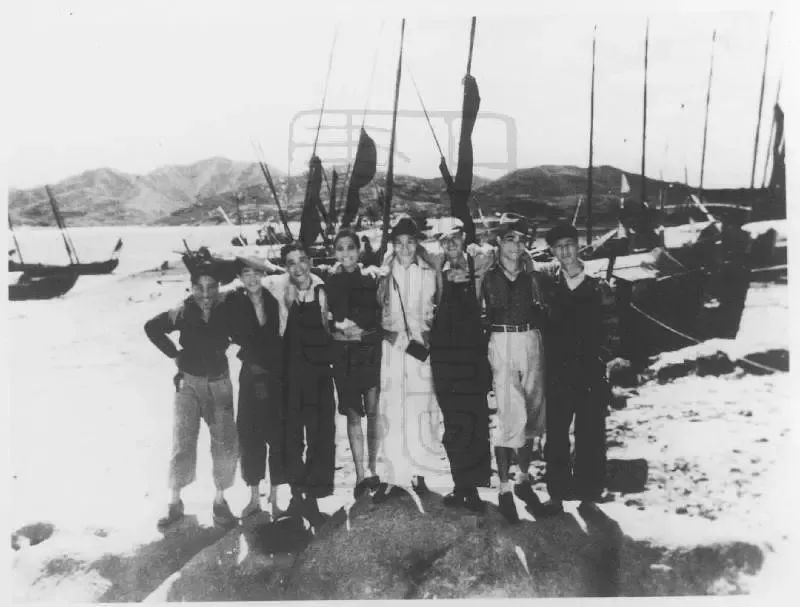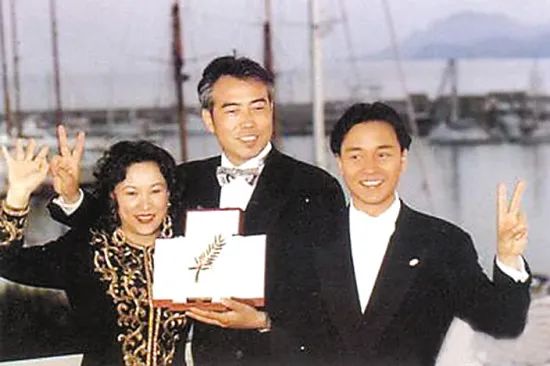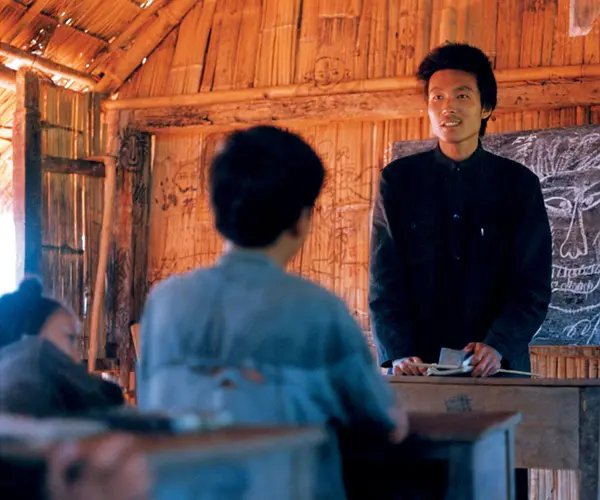Cannes: The Past and Prospects of Chinese Cinema
“Clouds float in the sky, and fishes hide in the water...”
These are the lyrics of Song of The Fishermen, sung by Wang Renmei, a famous performing artist. This year also marks the 90th anniversary of the release of the film of the same name. Her song has not only traveled through the times, but also from China to the world. In 1935, the Song of The Fishermen won a prize at the Moscow International Film Festival, making it the first Chinese film to win a well-known international honor. It was also an important step for Chinese films to go global.

Tao Boxun, manager of Lianhua Film Company for general distribution, attends the Moscow International Film Festival
In China at that time, when the nation was trying to save itself, it seemed like a unreachable dream for filmmakers to create works freely and bring them go global.
However, through unremitting efforts by filmmakers from generation to generation, this distant dream has come true.
In the adventures of this dream, the Festival de Cannes is a particularly special one, because to date, only one Chinese film has won the Golden Palm. We hope that Chinese cinema can compete with world cinema at Cannes, and look forward to the second Golden Palm.
▌Two famous directors began to display talents
Chinese cinema has a deep connection with the Festival de Cannes.
As early as 1955, a special screening activity for Liang Shanbo and Zhu Yingtai by director Sang Hu was held at Cannes. In 1956, Cai Chusheng, director of Song of The Fishermen, was invited to lead a film delegation to Cannes.

Cast and crew of Song of the Fishermen
The two directors, who are representatives of the second generation of Chinese directors, didn't compete for any awards, but led the charge.
In 1960, Han Hsiang Li, director from Hong Kong, China, attended the 13th Festival de Cannes with The Enchanting Shadow, which was nominated for the Competition Section. In 1962 and 1963, his directorial films, The Magnificent Concubine and Empress Wu, were respectively selected in the Competition Section of the 15th and 16th sessions, of which The Magnificent Concubine won the Technical Grand Prize. The Enchanting Shadow, The Magnificent Concubine and Empress Wu are three different stories of ancient Chinese women, and also the themes of traditional Chinese culture that the director excels in.

A still of The Magnificent Concubine
Following Han Hsiang Li, King Hu, a “little brother” of Li who also came to Hong Kong, China from Beijing, emerged. King Hu was nominated for the Competition Section of the Festival de Cannes for his film about an ancient Chinese woman with martial arts. A Touch of Zen not only let the world see the depth and breadth of Chinese martial arts films, laying the foundation for Chinese martial arts films to shine in the world in the future, but also brought an international vision to the heroine Feng Hsu. Years later, she came to Cannes twice with Farewell My Concubine and Temptress Moon as a producer, and took home the only Golden Palm.

Feng Hsu, Chen Kaige and Leslie Cheung at Cannes
▌Two generations of directors walked on the international stage
In 1982, The True Story of Ah Q by director Cen Fan became the first film to compete for an award at Cannes since the founding of New China. Like a spark of fire, he quickly ignited the international road of Chinese films. Six years later, Red Sorghum earned director Zhang Yimou the Golden Bear at the Berlin International Film Festival. In the same year, Chen Kaige was nominated in the Competition Section of Festival de Cannes for the first time for his directorial film, King of the Children.

A still of King of the Children
The two leading figures of the fifth generation of Chinese directors became frequent visitors at Cannes in the 1990s.
Director Zhang Yimou got three nominations, and once won the Jury’s Special Grand Prix. Director Chen Kaige received five nominations in the Competition Section, and won the only Golden Palm in Chinese cinema.
Following the fifth generation of Chinese directors, representatives of the sixth generation also became frequent visitors at Cannes. They strove to expand the territory and opened up a new situation of Chinese film.
Through the fifth and sixth generations of Chinese directors, as well as the works by directors from Hong Kong and Taiwan, China in the same period, the world-renowned actors have also continuously unlocked different identities and participated in the Festival de Cannes.
▌New forces brought diverse works
This year, a large number of contemporary directors such as Jia Zhangke, Guan Hu, Lou Ye and Peter Chan shined at the Festival de Cannes, and were nominated for different sections of the film festival with their new works.
Apart from Cannes, Chinese-language filmmakers are busy participating in major international film festivals.
At the Tokyo International Film Festival last year, Gu Xiaogang, an old friend of the BJIFF, was shortlisted for the Competition Section for his new film Dwelling by the West Lake, and conferred the Kurosawa Akira Award in 2023. Besides, Snow Leopard, which was directed by Pema Tseden, a pioneer of the New Wave in Tibetan Films, won the Tokyo Grand Prix in Competition.

Gu Xiaogang at the Tokyo International Film Festival
We believe that the internationalization process of Chinese cinema will become increasingly stable.
The official section of this year’s Festival de Cannes is not only the reunion of the sixth generation of Chinese directors, but also displays the diversity of the film festival in many aspects. All We Imagine as Light, a new film by Indian director Payal Kapadia, Bird, the latest work by British director Andrea Arnold, which won three jury prizes, and other films by female filmmakers, have balanced the gender ratio of the Competition Section to some extent.
Moreover, we can also see Megalopolis, a film by legendary director Francis Ford Coppola after years of preparation. A variety of films from different dimensions are gathered here to enrich the film selection thinking of the official section.
This makes us realize that the competition section of a film festival is its real vitality. It inspires us to work harder to develop the Competition Section of the Tiantan Award, and create more diverse screening sections.
Based on its advantageous platform, the BJIFF has actively released the latest festival achievements, award-winning films and projects of the 14th session abroad, and successfully hosted the “Beijing Film Night—BJIFF Promotion Conference in Cannes”, standing on the highland of world cinema and looking into the future. Peggy Chiao and Jia Zhangke also delivered speeches at the conference, together looking forward to a better future of Chinese cinema. This year is the seventh time Jia brought his work to Cannes, and netizens are concerned about whether his “goddess” Zhao Tao will win the best actress.

China Film Pavilion & Booth
▌The future has come, with all flowers blooming together
When attending an activity at the China Pavilion of the Festival de Cannes, Mao Yu, Executive Deputy Director of the China Film Administration of the Publicity Department of the CPC Central Committee, delivered a speech to talk about policies on introducing foreign films to the Chinese film market, which excited industry insiders and film fans. “We will optimize film introduction policies, support introduction business, and extensively introduce more diversified and abundant films from other countries with an open and inclusive attitude, allowing Chinese audiences to see the best films in the world,” Mao said.

Mao Yu, Executive Deputy Director of the China Film Administration of the Publicity Department of the CPC Central Committee, delivers a speech
China has the most enthusiastic fan group, and it was difficult to grab tickets for films screened at the BJIFF. The Chinese film market is like the wilderness, waiting for superior films.
Capernaum, a Lebanese film which won the Jury Prize at the Festival de Cannes and was rated 9.1 scores on Douban, was released in China and earned 376 million yuan at the box office. Although this film tells a story about Syrian refugees, the emotions expressed in it are a universal language. It has transcended national borders and cultural differences, bridged the gap in language and culture, and touched countless audiences, including Chinese viewers. Nadine Labaki, director of the film, is also an old friend of the BJIFF. In 2021, She served as a jury member of the Tiantan Award in the Competition Section. This year, she came back to the BJIFF for Back to Alexandria she starred in, which was shortlisted for the Competition Section, she starred in, and attended the Creation Forum: The Excellence and Diversity of Film Creation. This year, she was also one of the judges in the Competition at Cannes.

Nadine Labaki attends the Creation Forum: The Excellence and Diversity of Film Creation
The BJIFF has also been committed to exploring the diversity of the Chinese film market, and has created an exchange platform for Chinese and foreign filmmakers under the Market Screening section of this year's session, facilitating many copyright transactions.
We can see that the content of the film list is also very rich, including short films, WIP projects and finished films, providing cooperative exposure in different directions including financing, post-production, theatrical distribution, new media distribution and other aspects for film works at different stages.
In the meantime, this year’s Market Screening also featured several sections for the first time, including “Potential Adaptations”, “Official Selection” and “Young Filmmakers in Project Pitches”. It is expected that the filmmakers can reach out to and work with the industry guests and film buyers efficiently so that their films can go from script to screen.
▌Cannes from dream place to hall of honor
90 years ago, the Song of The Fishermen took the first step for Chinese films. Today, the BJIFF took us a step closer to the internationalization of Chinese cinema.
For us, every small step towards the hall of honor is very important. Without the spirit of perseverance of filmmakers from generation to generation, we are unable to see Chinese films shine at global stages.
These film exchanges have allowed the world to better understand China, and also let us know more about the world.
“What’s past is prologue”. The remarkable achievements of the past are the driving force for us to move forward and also the starting point for a new chapter. In order to reach the peak, you need to set out now.
Looking back on the past of Chinese films at Cannes, we can see the endeavors and efforts of Chinese filmmakers from generation to generation. Looking ahead, it may be more of self-confidence and inclusiveness for exchanges and mutual learning among civilizations.
We should sail forward despite the strong wind and treacherous waves at sea.
